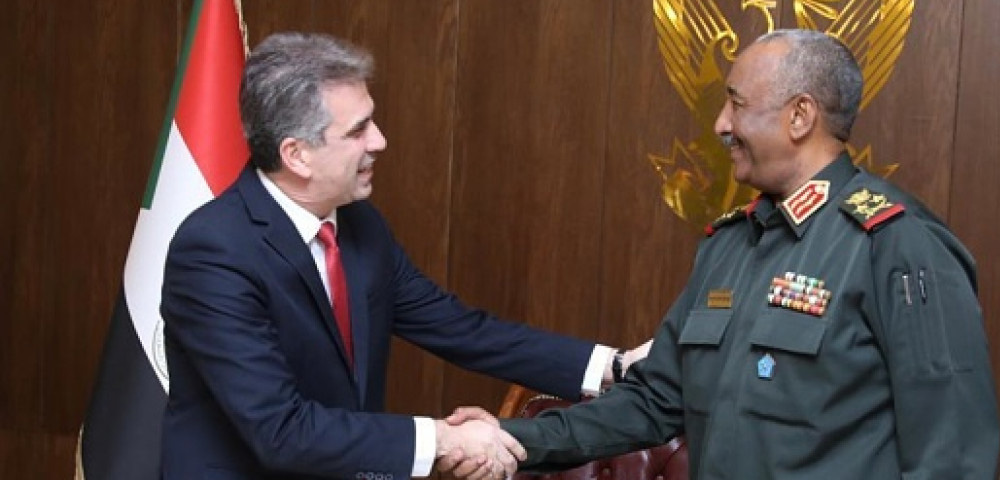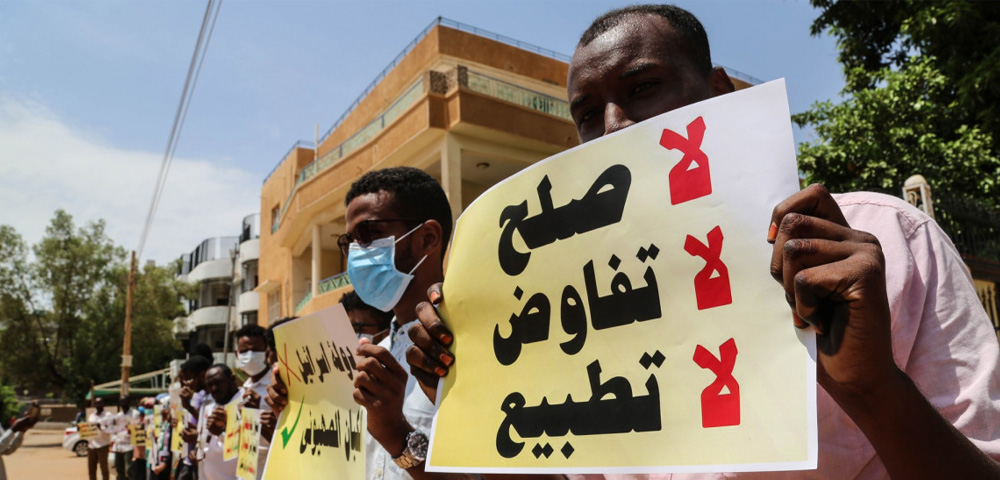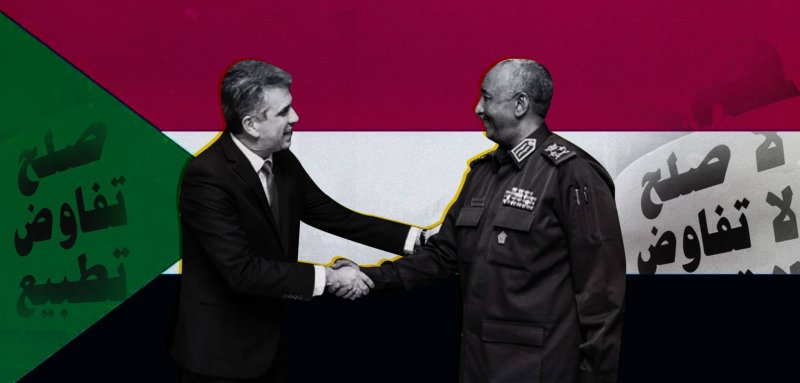It has been three years since Sudan and Israel have normalized relations, under the auspices of the United States. However, the agreement has not been officially ratified in Sudan, as since the revolution in December 2019, there have been no legislative institutions to endorse it.
In these years, the agreement has faced three main obstacles. Firstly, there was the military coup on October 25, 2021. Then, the war that erupted earlier this year between the army and the Rapid Support Forces (RSF) on April 15, and finally, the war on Gaza that broke out just a few months later, on October 7.
What should we expect given the current circumstances, and what does the future hold?
Postponed, not canceled
An official at the Sudanese Ministry of Foreign Affairs, who preferred to protect his identity, told Raseef22 that the normalization file is currently inactive, with no new developments since October 25, 2021. He described it as “almost frozen,” explaining that the file is under the direct supervision of the Sovereignty Council and is not discussed within the hallways of the ministry. The source rules out the possibility of establishing official diplomatic relations between the two countries in the near future, given Sudan’s instability and its lack of legislative authorities. He does, however, note “This does not negate the possibility that relations at the sovereign and intelligence-levels may have already been established.”
Haroun Medikhar, advisor to the RSF commander, says that normalization with Israel is strategic for Sudan, with talks to resume once the country stabilizes. According to him, Israel is an important state, and everyone in the AArab region seeks normalization.
Haroun Medikhar, Advisor to the RSF Commander, informs us that the relationship between the RSF and Israel has been governed by official institutional frameworks. After the war, things in Sudan changed. Medikhar explains that many countries now deal with the RSF as the party seeking stability and the restoration of democracy in Sudan, as opposed to the army that wants the return of the old regime.
Medikhar says that normalization is strategic for the RSF, and progress will resume once the country stabilizes. According to Medikhar, Israel is an important state, and everyone in the Arab region seeks normalization,“we do not see any obstacles preventing the completion of the project.”
Medikhar emphasized the significance of the RSF as a strategic partner to the international community, and highlighted the positive reputation it has fostered for its role in ensuring regional security. He praises the party’s collaboration with the European Union in combating illegal migration and human trafficking, concluding “we have good experience in establishing diplomatic and foreign relations.”
Raseef22 also spoke with Haider Badawi Sadiq, former spokesperson for the Sudanese Ministry of Foreign Affairs, who asserted that normalization will be completed, especially if there are changes in the political leadership of both countries. Sadiq argues that both Abdel Fatthah al-Burhan and Benjamin Netanyahu are influenced by the extremists in their respective countries, despite the general public in both countries leaning towards peace. He downplays the impact of the war on Gaza on Sudan-Israeli normalization, suggesting that Hamas does not represent all Palestinians, and points out the increased public awareness in the conflict.
The two generals
Two months before the outbreak of the war in Sudan, Israeli Foreign Minister Eli Cohen visited Khartoum. On the occasion of this visit, a statement was issued by the Sudanese Ministry of Foreign Affairs, “It has been agreed to move forward towards the normalization of relations between the two countries.”
 Eli Cohen and Abdel Fattah Al-Burhan in Khartoum
Eli Cohen and Abdel Fattah Al-Burhan in Khartoum
However, the outbreak of fighting between the Sudanese army and the RSF raises questions about Israeli allegiance within Sudan. Initially, Israel regarded Al-Burhan favorably, especially in light of the communication between him and Netanyahu in the Ugandan capital in February 2020.
Political analyst Osman Mergani explains that the RSF has benefited from its relationship with Israel, through acquiring advanced weaponry and espionage, surveillance and jamming devices, all of which they have used during the civil war.
Soon after, it was reported by a number of Israeli outlets, including Walla, that a meeting had taken place in Abu Dhabi between RSF leader Mohamed Hamdan Dagalo (referred to as Hemedti) and former Israeli Mossad chief Yossi Cohen. Following this encounter, which occurred without the knowledge of Al-Burhan and then-Prime Minister Abdalla Hamdok, relations between the RSF and Israel strengthened. Israeli media reported that RSF Commander Abdelrahim Dagolo visited Tel Aviv in October 2021, further indicating the RSF's attempts to establish independent channels of communication with Israel.
Political Analyst Osman Mergani confirmed to Raseef22 that the Israel relations file was part of the power struggle between the two generals, Al-Burhan and Hemedti. He points out that both figures regard normalization with Israel as a tactical alliance to maintain power, rather than a strategic geopolitical move. Mergani points out that the RSF seems to have gained more from its relationship with Israel than Al-Burhan, acquiring advanced weaponry and espionage, surveillance, and jamming equipment, all of which they have used during the war.
 Sudanese people protest against normalization
Sudanese people protest against normalization
However, Haider Badawi Sadiq dismissed the notion that Israel has provided support to either warring party in Sudan. Sadiq argued that Israel is preoccupied with its own issues and wars, emphasizing that any “agreement with Israel would be governed by the political interests of both countries, taking precedence over other factors.”
The future of normalization
Global allies of the RSF are closer with Israel than the allies of the Sudanese army. The United Arab Emirates and Chad, for example, both have strong ties with Israel, whereas Egypt, the primary ally of the Sudanese army, provides an example of a country with a strained relation to Israel.
However, the United States remains a crucial player in the normalization between Sudan and Israel, especially considering Sudan’s reliance on Washington to reinstate the debt relief program, which was suspended after the coup in October 2021. The Sudanese army is unlikely to risk antagonizing Washington on the normalization issue.
The US is a crucial player in normalizing relations between Sudan and Israel. Sudan relies on Washington to reinstate the debt relief program, suspended after the coup in October 2021. It was also listed as a condition to be removed from Trump’s Muslim Ban.
Osman Mergani regards the initial enthusiasm for normalization as fueled by the involved parties’ short-term interests. Sudan needed to be cleared from former US President Donald Trump’s Muslim Ban list, and normalization with Israel was the condition set by the Trump administration. As for Israel, Mergani believes it was motivated by economic interests, taking advantage of the opening of Sudanese airspace for its aircrafts.
Mussaab Mohamed Ali, professor of political science at Nile University, believes that the impact of the ongoing Gaza war on the normalization process will be significant, especially in regards to popular opinion. Continued rapprochement with Israel could be met with disapproval, due to the inhumane crimes committed by the Israeli army against Palestinians in the occupied territories.
Raseef22 is a not for profit entity. Our focus is on quality journalism. Every contribution to the NasRaseef membership goes directly towards journalism production. We stand independent, not accepting corporate sponsorships, sponsored content or political funding.
Support our mission to keep Raseef22 available to all readers by clicking here!
Interested in writing with us? Check our pitch process here!





